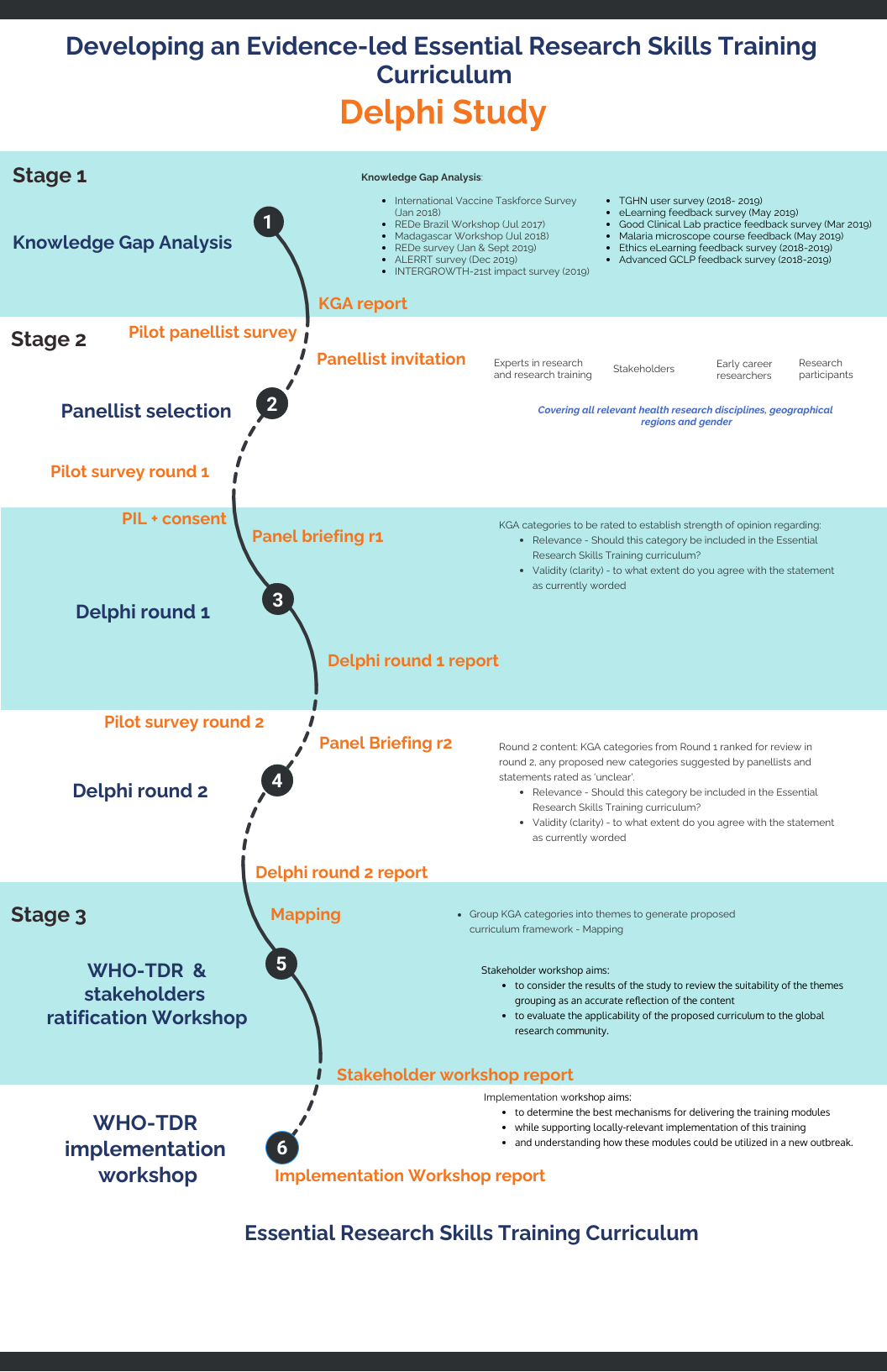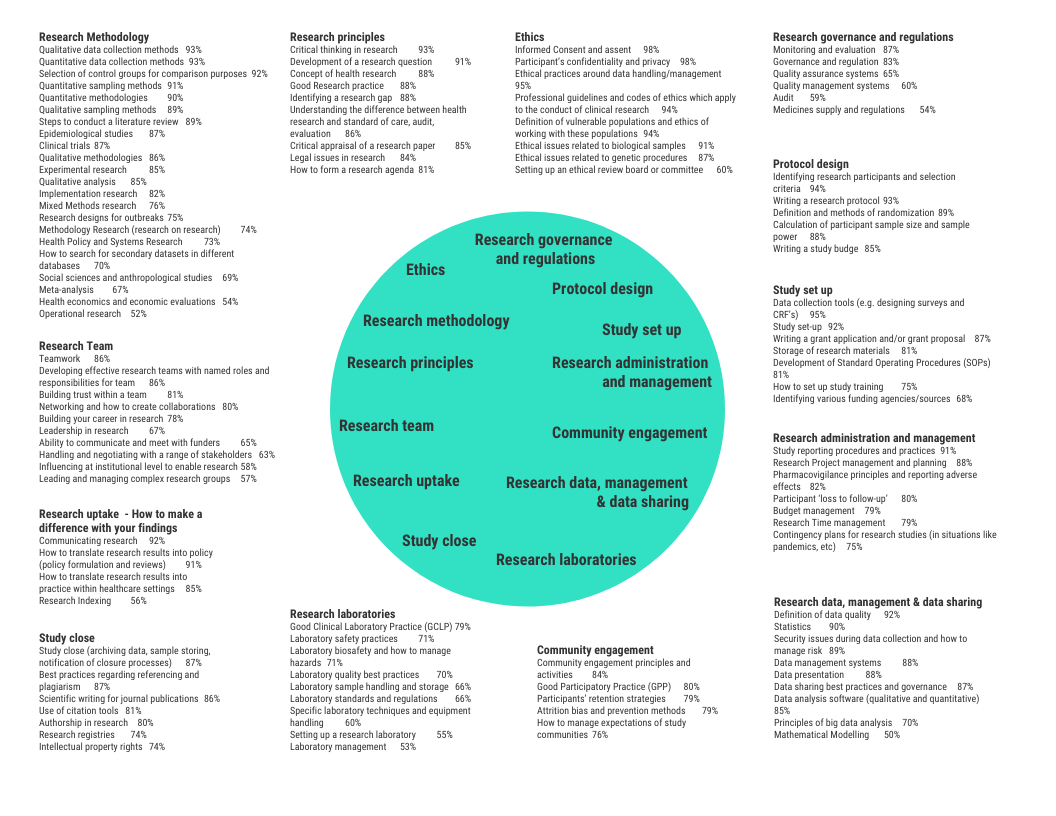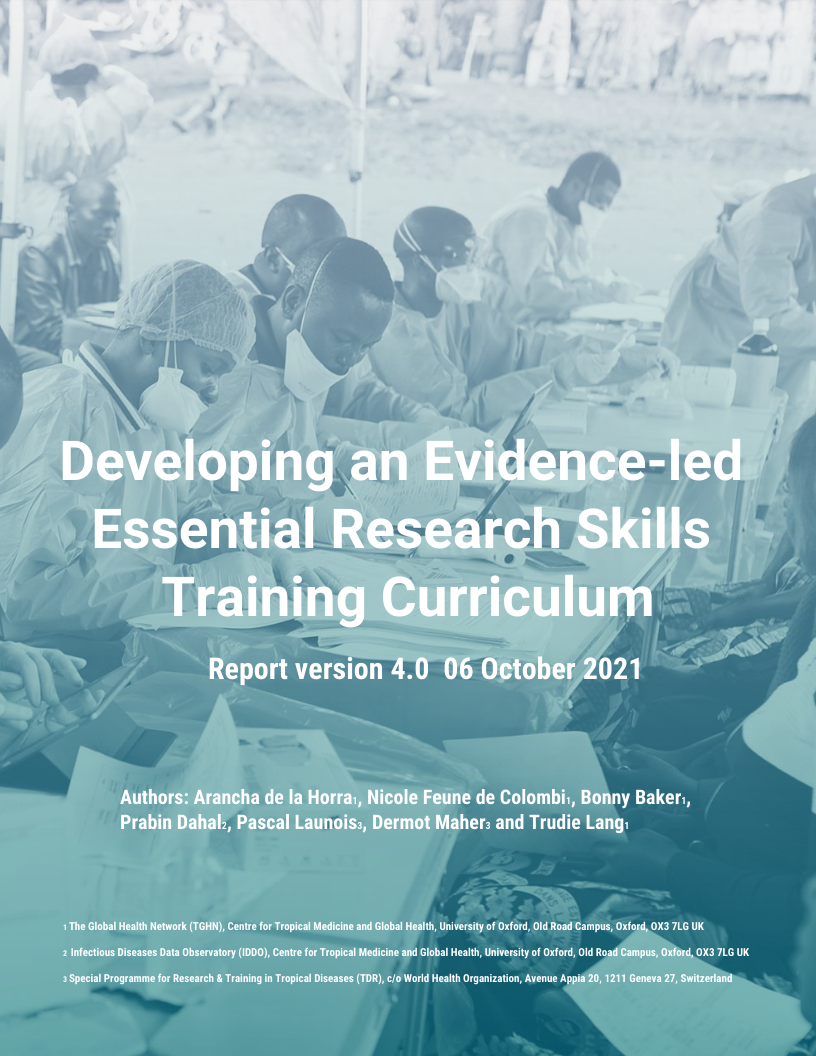This study was developed as a collaboration between the Special Programme for Research and Training in Tropical Diseases (TDR) and The Global Health Network (TGHN).
The aim of the Essential Research Skills Training Curriculum study is to identify the minimum set of skills, knowledge and key principles that would enable those with limited or no previous experience to undertake high-quality research for health. The study design was underpinned by a three-stage mixed methods consensus methodology to ensure an evidence-led approach for establishing this curriculum.
Download final report (.PDF)

The Research Methodology and Findings
Stage 1: Gap Analysis
As developed through a mixed-methods consensus protocol, we conducted a comprehensive review of the responses from a series of research training needs surveys, session evaluations from research training workshops and feedback submitted on completion of e-learning, collected by TGHN from 2017 to 2019. We analysed the responses of 7176 participants from across 153 countries. This analysis provided us with a range of research skills topics and subject areas that generated a core list of 98 research-training themes.
Stage 2: e-Delphi Study
The second step aimed to find consensus on what constituted the minimum set of skills, knowledge and key principles that would enable those with limited or no previous experience to undertake high-quality health research. We conducted a two-round online Delphi study to prioritize the outcomes of the gap analysis. The Delphi panel for this study comprised both experts and stakeholders in the field of research for health and research for health training, with heterogeneous expertise and from diverse geographical regions. We sought to include views of researchers, research participants, research training facilitators, members of research advisory committees, research funders, authors of peer-reviewed research training papers, authors of research training books/programmes, journal editors, research policy-makers and regulators.
e-Delphi Round 1 - The Delphi Round 1 survey offered an opportunity for panellists to (i) indicate which of the 98 themes derived from the stage 1 gap analysis they considered essential for inclusion in the Essential Research Skills Training Curriculum, and (ii) suggest any themes that might have been omitted.
The themes presented were scored by the panel on the basis of two classifications: [a] relevance (should this theme be included?) and [b] clarity of each statement (is it clear what the category or theme reflected?). There were 254 members on the Delphi panel for Round 1. The panel reached consensus on 43 listed themes to be included in the Essential Research Skills Training Curriculum. No consensus was reached for any theme to be outrightly excluded from the proposed framework. The remaining 55 themes were re-evaluated in Round 2 (including eight themes indicated as unclear in Round 1) and alongside 10 new themes generated by panellists in Round 1.
e-Delphi Round 2 - The Delphi Round 2 survey re-evaluated the remaining 55 themes including eight themes indicated as unclear in the first round and alongside the 10 new themes generated by panellists in Round 1. For the purposes of Round 2, themes were scored using a nominal scale [yes/no] for both classifications; relevance and clarity. There were 222 panellists participating in Round 2.
At the end of Stage 2, a final list of 108 themes was generated for inclusion in the curriculum. The research team grouped the themes into 13 ‘parent modules’ which were reviewed by the stakeholders attending the Stakeholder Review Workshop in Stage 3.
Mapping the themes- Following the e-Delphi study, the research team developed a curriculum framework by grouping the 108 themes identified by the panellists. This presented the structure of the curriculum by providing suggested ‘parent modules’ and the relevant themes generated and included to inform each module. These theme groupings were initially presented and evaluated at a Stakeholder Review Workshop hosted in December 2020.
Stage 3: Review and Validation Workshops
Stakeholder Review Workshop
Stakeholder Review Workshop- In December 2020 we conducted a Stakeholder Review Workshop. This session brought together a diverse group of stakeholders from across the globe to consider the implications and applicability of the proposed Essential Research Skills Training Curriculum. The aim of this workshop was to consider the results of the study, to review the suitability of the theme groupings as an accurate reflection of the content and to evaluate the applicability of the proposed Essential Research Skills Training Curriculum findings to the global research community. The workshop polling exercise undertaken during the session showed substantial agreement between the Delphi panel’s ratings and the opinions of the workshop stakeholders. This provided support for the acceptability of the proposed curriculum as a global standard for health research training.
Implementation Workshop- In February 2021 we organized an Implementation Workshop to seek input from global health community researchers on how best to implement this curriculum and convert it into training and teaching resources relevant for the global research community. This workshop generated broader considerations on implementation to ensure that faculty and institutions wanting to design their training around this curriculum could also benefit from evidence-led recommendations such as:
- Participants indicated a preference for learning to be delivered as interactive educational sessions, problem-based learning and discussions with facilitator or mentor alongside downloadable resources.
- Provision of certificates of completion and course endorsement by leading global health institutions are the strongest motivators for trainees.
- Providing multiple options for training delivery such as “training the trainer” resources, hands-on experience, networking opportunities, mentorship and access to experts as well as having materials available in multiple languages.
- Providing curriculum materials for trainers in module format would help the integration of this framework within existing local research training programmes. Linking the training with career development schemes and academic institutions would support the uptake of health research training.
- Embedding this curriculum in global, national and institutional outbreak response plans would guide the development of research training in such emergencies.
Implementation Workshop
Conclusion and Recommendations
This project has concluded an Essential Research Skills Training Curriculum that is appropriate for all types of health research study and can be implemented in health care settings with little or no previous research experience. This robust and comprehensive research and consensus process has determined that if these modules are delivered to a research team then these would cover the fundamental and essential elements required to assure a well-designed, safe, ethical and high-quality study.
This process has resulted in a clear curriculum framework in the form of a set of modules that any research group, team or organization can actively use to implement and guide their training programmes. This comprehensive research study has also generated guidance on implementation so that any organization wanting to design or strengthen training programmes or courses around this curriculum can also benefit from evidence-led recommendations on what approaches will work best in their specific context.
In summary, The Essential Research Skills Training Curriculum is an evidence-led set of modules that has been determined through the participation of over 7000 researchers and health workers across the globe. This three-stage process concluded the development of a definitive list of modules that would serve as a curriculum that could assure delivery of the full set of steps and skills needed to undertake health research in places and settings inexperienced or new to research. This set of 13 modules covers all aspects of the research cycle including study design, conduct, analysis and reporting the findings as recommendations for policy and practice. Delivering training aligned with this curriculum framework will help promote and ensure that research should be safe, ethical and robust, and that local teams are equipped with lasting research skills, community engagement and management practices that will advance and support their careers.

Figure 1. Mapping of the Essential Research Skills training Curriculum framework themes into modules following Stakeholder review workshop. Please note that the themes listed within the modules/groups do not represent individual lessons to be delivered. They are an indication of essential concepts to be included within the module.
Study Documents and reports:
Panellist information sheet v1.0 05/02/2020
Essential Research Skills Training Curriculum - Delphi survey round 1 report
Essential Research Skills Training Curriculum - Delphi survey round 2 report
Essential Research Skills Training Curriculum - Stakeholder Workshop 17 Dec 2020 Report
Essential Research Skills Training Curriculum - Implementation Workshop 10 Feb 2021 - Briefing
Essential Research Skills Training Curriculum - Implementation Workshop 10 Feb 2021 Report
Essential Research Skills Training Curriculum - Overall report

